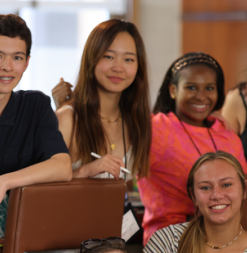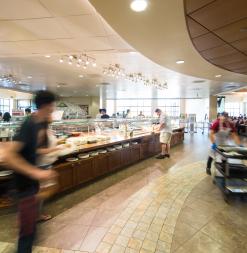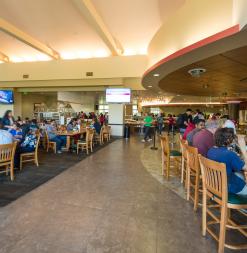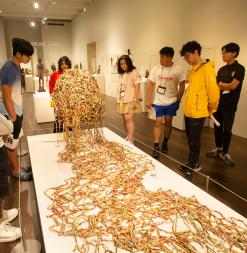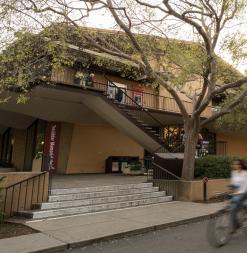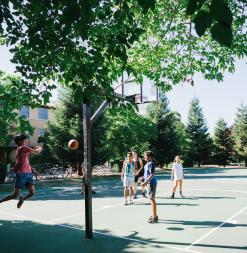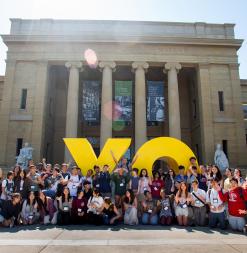A team of residential staff live in each residence hall with the participants to provide 24/7 support, guidance, and supervision. The residential staff develop rich living and learning environments that complement the program’s academic curriculum. Stanford Pre-Collegiate Studies believes valuable growth experiences occur outside of the classroom and plans a variety of activities and experiences throughout the program to support that learning.
COVID-19 Policy
Participants’ health and well-being is Stanford Pre-Collegiate Studies’ top priority. Stanford Pre-Collegiate Studies will be following all Stanford University COVID-19 related policies and procedures. All policies are subject to change before and during the program; continue to monitor this website and email communications for important updates. Stanford Pre-Collegiate Studies will notify a participant’s parent/legal guardian and Designated Adult if the participant tests positive to discuss next steps. Participants will be required to take a rapid antigen test if they become symptomatic during the program.
In the event of any emergency, or if the participant tests positive for COVID-19, the parent(s)/legal guardian(s) are the participant's primary emergency contact(s).
Housing and Roommate Assignments
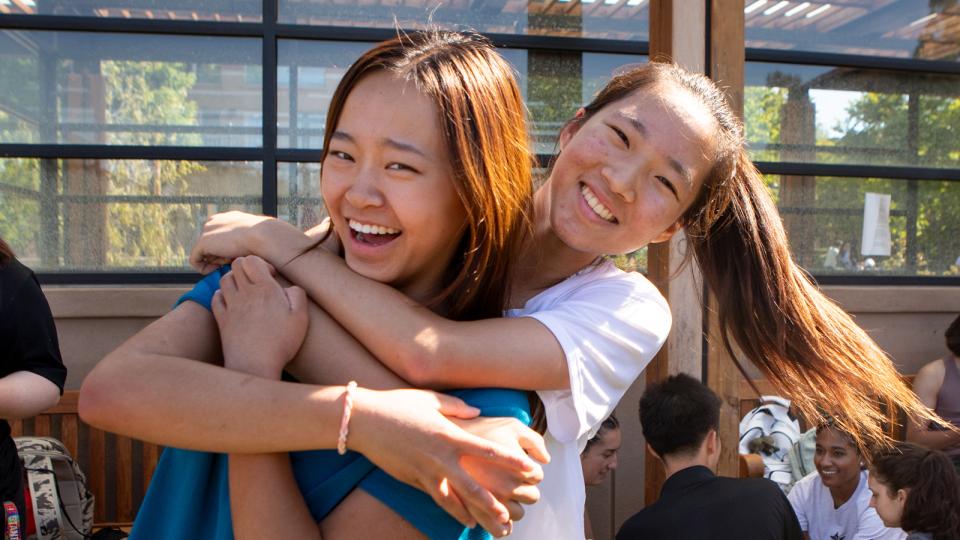
Your Home for the Summer
To protect the privacy of all participants, room and roommate assignments are not shared until arrival day check-in. Due to the brief duration of the program, roommate requests and room changes are not permitted.
Room Information
Shared Bedrooms
Room Furniture
Gendered Room Assignments
Common Social Spaces
Accommodation Request Process
Participants with a disability who may need an accommodation must initiate the request by submitting the SPCS Courtesy Accommodation request form. SPCS staff will evaluate the request, recommend reasonable accommodations, and communicate results with participants, families, instructional teams, and staff as needed.
Participants are responsible for:
- Working with course instructors to discuss the implementation of the accommodations.
- Adherence to the same academic, technical, performative and behavioral standards expected of all participants.
Stanford is committed to ensuring equal access to its educational programs for students with disabilities as specified under Section 504 of the Rehabilitation Act of 1973 and the Americans with Disabilities Amendments Act of 2008.
Residence Hall Logistics
Cleanliness
University custodial staff will clean the residences on a regular basis. Common spaces will be cleaned most weekdays, and bedroom linens and trash cans will be exchanged once a week. In addition, participants will work together to keep the common spaces clean and organized throughout the session’s entirety.
Room Fixtures
Each room will have the same furniture used during the regular academic year by Stanford undergraduates.
Room Maintenance and Staff Access to Rooms
Requests for room maintenance should be directed to residential staff. Residential staff strive to notify participants in advance of room entries related to housekeeping and maintenance, but in some cases, notifications may not be able to be provided. Stanford Pre-Collegiate Studies reserves the right to enter participant rooms at any time for health, safety, welfare, or law enforcement purposes.
Laundry
Participants will have access to a washer and dryer in their residences and are expected to do their own laundry during the course of the program. Laundry is free and does not require coins or cards to operate. Residential staff will provide information about laundry early in the program and will keep the laundry room stocked with necessary supplies.
Environmental Awareness
Participants are expected to be good stewards of resources during their time in Stanford Pre-Collegiate Studies and are encouraged to abide by these guidelines:
- Conserve water by not leaving faucets running or taking excessively long showers.
- Utilize the reusable water bottles provided to you on arrival day throughout the program.
- Conserve energy by turning off lights and other electrical devices when not in use.
- Conserve paper by only printing documents as necessary.
- Recycle and compost in the appropriately marked containers.
Fees
Participants are responsible for keeping keys in their possession at all times. Participants will be issued a brass room key, a building access fob, a dining hall access card, and a library access card. Participants should immediately notify Stanford Pre-Collegiate Studies residential staff if a bedroom or residence key has been lost. The residential staff will ensure a new key is issued as soon as possible.The following fees will be assessed if a participant loses any of these items during the program:
- Room Key and Fob: Approximately $200.00 (exact cost depends on if one or both were lost)
- Dining Access Card: $15.00
- Library Access Card: $25.00
Stanford Pre-Collegiate Studies will email payment instructions to the parent or legal guardian of any participant who loses a key at the end of the program.
Meals are eaten in campus dining facilities managed by Stanford Dining, a dedicated team of food professionals that prides itself on providing high quality, delicious, and healthy cuisine. The dining hall used by Stanford Pre-Collegiate Studies, Wilbur Dining, offers a variety of fresh and nutritious meal selections.
Dietary Needs and Restrictions
Diverse Diets
Clear Ingredient Labels
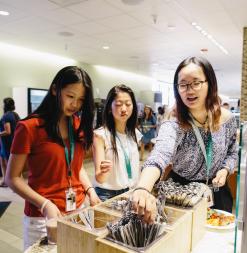
Food Preparation Details Always Available
Commitment to Sustainability
Contacting Stanford Pre-Collegiate Studies
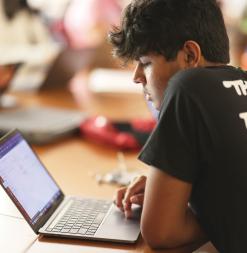
Email Us: spcs-residential@stanford.edu

Phone
First Few Days
Adjusting to the Program
Some participants may feel homesick at the start of the program or require a few days to adjust to course expectations and new surroundings and routines. To ease the transition to campus, participants are encouraged to set a regular check-in time with families and friends back home for support and connection. Since this is a great opportunity for participants to advocate for themselves in a collegiate environment, we encourage participants to speak directly with staff about any concerns that arise during this transition.
A Supportive Environment
Stanford Pre-Collegiate Studies staff are attentive to the needs of the participants at the start of the program. There will be many icebreakers and activities in the first several days to help everyone get to know one another and become familiar with Stanford’s campus.
Contacting Participants
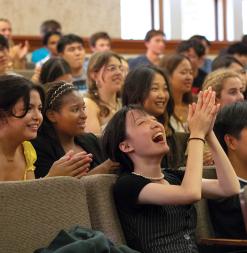
By Phone
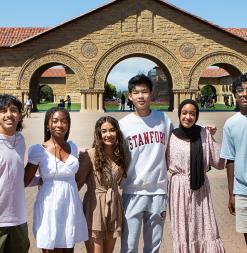
By Mail
[Participant Name] - SPCS/[Program]
365 Lasuen Street
West Lobby - Basement
Stanford, CA 94305
Important Notes
- Stanford Pre-Collegiate Studies is not responsible for misplaced mail. Stanford Pre-Collegiate Studies will not ship or mail any items to participants after the end of the program.
- Be sure to include the name of the participant and program on all mail and packages.
- We strongly recommend students leave items with significant sentimental or monetary value at home.
- There is no mail delivery on Saturdays or Sundays. All mail must be delivered to Stanford three days before the end of the program.
- Mail delivery to residence halls often takes an extra day or two because it arrives at a campus office and is then sorted and delivered to the participant.
Campus Resources
Stanford Pre-Collegiate Studies participants will take on new responsibilities as they adjust to residential life. Here are key aspects of campus life—from enjoying sunny outdoor activities to managing everyday essentials like accessing cash.
Banking

Outdoor Outings
Recreational Facilities
Health and Safety at a Glance
Residential Safety
Our residential staff partner with the Stanford University Department of Public Safety, Stanford Environmental Health and Safety, and Stanford Conferences and are trained to handle emergency situations and participants will be briefed on campus safety procedures during their opening hall meeting.
Medical Facilities
In the event of an illness or injury that cannot be treated by the on-site staff or an emergency, participants will be taken to Palo Alto Medical Foundation Pediatric Urgent Care or the Stanford Hospital Pediatric Emergency Department, based upon the level of care needed and the hours that the facility is open. In the event that a participant needs medical care, program staff will contact the participant’s parents/legal guardians and will remain in contact until medical care is complete.
Emergency Updates
In the event of a disaster or emergency affecting the Stanford community, updates can be found online. Residential staff will receive emergency alerts via text message or email and will relay that information to program participants.
Our Safety Principles
Residential Security
Exterior doors and windows of the residences should be closed and locked when the residence is unattended. Participants should also keep the doors and windows to their bedrooms closed and locked whenever they are not in their room. Any suspicious activity should be reported immediately to residential staff, who in turn will contact Public Safety and Stanford Pre-Collegiate Studies professional staff as needed.
Mandatory Reporting
California law requires certain individuals at Stanford to report known or reasonably suspected child abuse or neglect to the authorities. These individuals are known under the law as "Mandated Reporters.” All instructors and members of the Stanford Pre-Collegiate Studies staff are Mandated Reporters, as are many of the members of the larger Stanford University community with whom participants interact.
Personal Medicine
All participant prescriptions and medications, especially epinephrine or other anaphylaxis medications, should be up-to-date for the length of the Stanford Pre-Collegiate Studies program. All medications should be in their original, labeled packaging. Participants are responsible for self-administering all medications brought with them to the program.
Over the Counter Medications
Participants are encouraged to bring their own over-the-counter pain medication or allergy medicine with them to the program. Stanford Pre-Collegiate Studies staff can provide certain over the counter medications (ibuprofen, Benadryl, bandages, etc.) if a participant’s parent or legal guardian has authorized them to do so in CampDoc. Stanford Pre-Collegiate Studies will only administer over-the-counter medications if authorized in writing. Families are encouraged to review all over-the-counter medications listed on CampDoc prior to submitting to ensure staff have the most accurate information.
